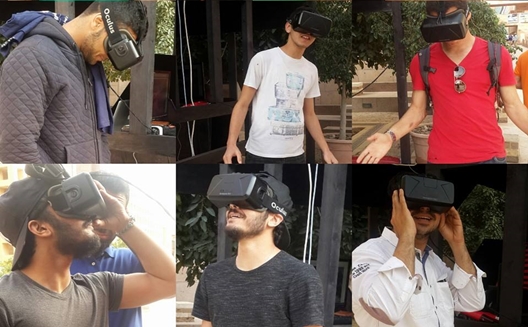Zombies in Egypt: Epic VR brings the undead to malls


This was
the reaction when students first tested Epic VR in an event at the
American University in Cairo. (Images via Epic VR)
Virtual reality is the market of 2016, a fact not lost on the three founders of Egypt’s Epic VR gaming company.
Ahmad Atef, Ahmad Helmi and Ihab Ayman launched the idea in October 2015, joining Escape HD, in the tiny Egyptian virtual reality (VR) gaming market.
Epic VR applies the technology of mixed reality, which merges aspects of the real world with a virtual gaming world, and virtual worlds. This produces new environments and visualizations where physical and digital objects co-exist and interact in real time.
"We added new dimensions to the virtual reality to make the player feel that he is part of the game, where his movements can be mimicked in the game," Atef said. "If the player has a door in front him [in reality], he can open that door in the game itself, and he can grab a ball and throw it at his enemies, or to shoot them with a gun in his hand.
Atef said the games they developed did not use a space larger than 25 square meters, and the team's first game is called Zombies, on which they tested their visual tracking system.
Progress in a short time
Epic VR made it to the semifinals at this year's MITEF competition in Saudi Arabia in April 2015.
"We were chosen among 16,000 participants that included startups and entrepreneurial ideas from all over MENA, and despite being quite recent we were chosen by the organizers as part of the startup track," said Atef.
Epic VR joined the sixth batch of the American University in Cairo (AUC) V-Lab accelerator in February.

Cofounder
Ahmad Atef explains Epic VR during the launching of AUC V-Lab
incubator’s sixth batch.
Efforts for crowdfunding
The founders launched a crowdfunding campaign on Tennra as part of the Injaz startup competition, which closed in April, to help pay for product development.
Given the newness of the virtual reality gaming industry, the cost of gaming accessories such as earphones, eyeglasses and sensors is very high.
"The cost of having a visual tracking program in a gaming unit is $10,000 for 25 square-meter and $65,000 for a 100 square-meter," Atef said. 'So we decided to develop this system via a technical team."
The campaign's duration was six weeks from mid February until the end of March. The target was to raise $4,000, of which they raised $2,280 in the first 15 days alone from 89 contributors inside Egypt.
Games for malls
The founders plan to sell the gaming units - a device loaded with games Epic VR has designed - they develop to leasiure centers in malls.
The Epic VR team (which includes six developers, most of them recent computer science graduates) plans to develop arcade game units that cover a space of 25 square meters and sell them to amusement parks through distributors such as Puto Games and others, and specialized exhibitions.
One gaming unit will cost around $30,000. The founders are looking into a profit sharing model for buyers, but that won't be easy until they can demonstrate a demand for gaming units, and indeed this is what they're doing. Their first event in AUC was to attract students to try their products.
"We will continue our attempts to prove the size of the market of our products, in order for the perfect business model to take form," Atef said.
In order to do that, the team is seeking a partnership with Egyptian game studio 5D which will enable them to develop their first product using the studio's facilities.
At a later stage they plan to sell virtual gaming reality units outside of Egypt via ecommerce, since the spare parts can be easily shipped and reassembled.
"We'll add the option of performing online maintenance on them remotely," Atef said.
Global competition
The global virtual reality gaming industry is expected to make $3.8 billion in revenue this year from an anticipated user base of 43 million in 2016.
In 2012, virtual reality gaming was worth $466.6 million and expected to reach $5.8 billion by 2019.
A long journey awaits the team if they wish to be on par with global competitors like VRcade and Avaterico. Based in the US, VRcade sells its virtual reality systems online. As for the Spain-based Avatarico, it displays virtual reality games on its platform for an hourly fee.
Epic VR founders are not afraid of competition. "The cost of overseeing employees in Egypt is much less than that abroad, and programming is done locally, so it's less expensive," Atef said.


